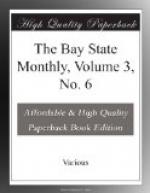The prodigious contrast between the preaching and practice of polygamy was fully displayed. Mormons claim that there is a vast difference between bigamy and polygamy; that only good men are allowed to take plural wives; that no saint takes more wives than he can support, and that a muchly married “man of God” exercises the most rigid impartiality in the bestowal of his affections upon his various women. Miss Field upsets these beautiful theories by graphic pictures drawn from life, and cited Brigham Young himself as “a bright and shining lie to the boast of impartiality.” Brigham Young’s coup d’etat in granting woman suffrage in 1871 was illuminated, and emphasized by the assertions:—“A territory that has abolished the right of dower, that proclaims polygamy to be divine, that has no laws against bigamy and kindred crimes, that has no just appreciation of woman, is unworthy of self-respecting humanity, woman suffrage or no woman suffrage.” Miss Field makes in these lectures a telling exposition of the doctrine of blood atonement, passing on to these Mormon missionaries and their methods, and the people who become “fascinated with the idea of direct communication with heaven through the medium of a prophet,” and to whom the missionary brethren prudently “leave the mysteries of polygamy to the imagination,” while they inculcate the importance of “gathering to Zion.” She outlined the educational status and the discouragement given by Brigham Young to all educational progress. Of Mormon treason she says:—
“Five years after the United States had established the Territory of Utah its people were in armed rebellion because the government dared to send a Gentile governor and national troops to Utah.”
Nor does she spare the United States in its responsibility for these crimes. “The United States to-day,” said Miss Field, “is responsible for thirty years’ growth of polygamy, with its attendant degradation of woman and brutalization of man.” As an illustration of this conclusion, she told a most interesting story of which Governor Harding of Utah, Brigham Young, Benjamin Halliday, Postmaster General Blair, Abraham Lincoln and William H. Seward were the characters. The story is a dramatic and significant bit of Mormon history, related for the first time. It led up to an earnest and eloquent peroration of which the final words were: “’I’ll believe polygamy is wrong when Congress breaks it up; not before!’ exclaims a plural wife. Men and women of New England! You who forge public opinion; you who sounded the death knell of slavery, what are you going to do about it!”




